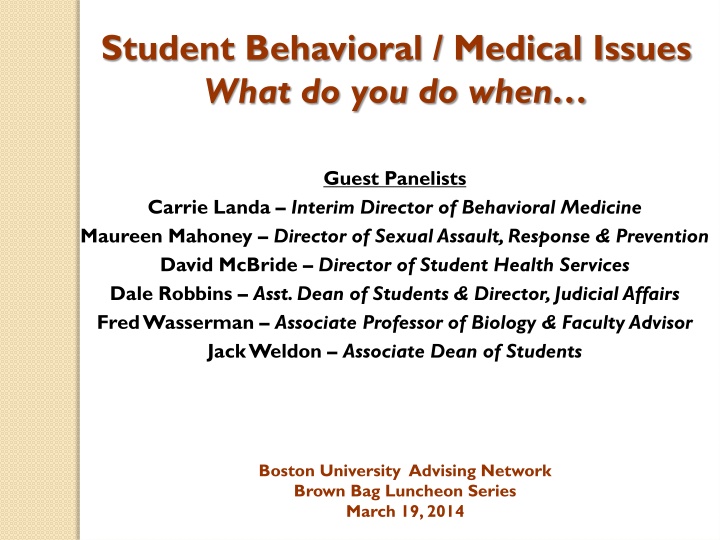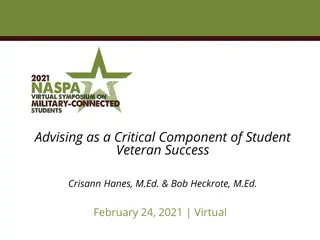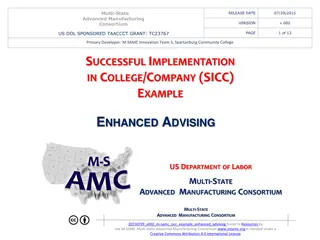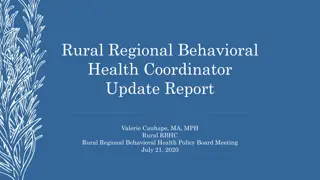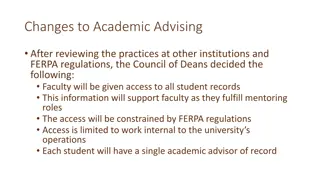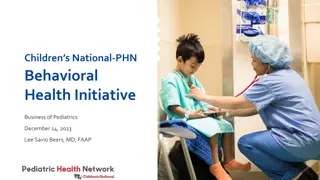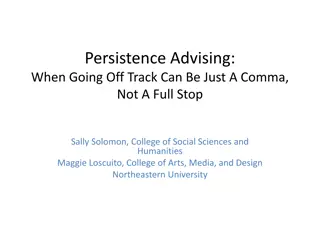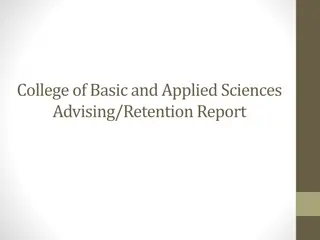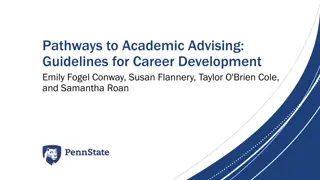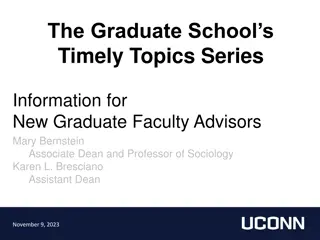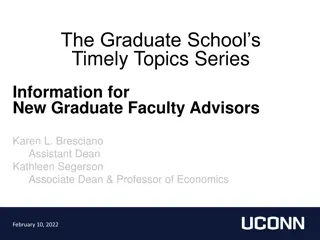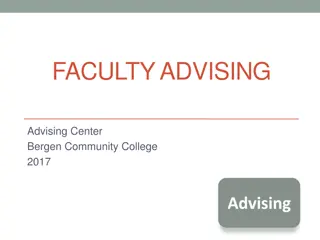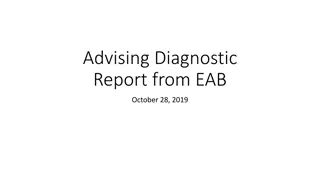Student Behavioral/Medical Issues: Advising for Support
In challenging situations like disclosing assault, cancer diagnosis, or academic struggles, knowing when to seek help and recognizing warning signs of stress is crucial. Discover resources, referral strategies, and privacy considerations for assisting students in need.
Download Presentation

Please find below an Image/Link to download the presentation.
The content on the website is provided AS IS for your information and personal use only. It may not be sold, licensed, or shared on other websites without obtaining consent from the author.If you encounter any issues during the download, it is possible that the publisher has removed the file from their server.
You are allowed to download the files provided on this website for personal or commercial use, subject to the condition that they are used lawfully. All files are the property of their respective owners.
The content on the website is provided AS IS for your information and personal use only. It may not be sold, licensed, or shared on other websites without obtaining consent from the author.
E N D
Presentation Transcript
Student Behavioral / Medical Issues What do you do when Guest Panelists Carrie Landa Interim Director of Behavioral Medicine Maureen Mahoney Director of Sexual Assault, Response & Prevention David McBride Director of Student Health Services Dale Robbins Asst. Dean of Students & Director, Judicial Affairs Fred Wasserman Associate Professor of Biology & Faculty Advisor Jack Weldon Associate Dean of Students Boston University Advising Network Brown Bag Luncheon Series March 19, 2014
Student Behavioral/Medical Issues What do you do when . Your advisee Kay discloses that she was recently assaulted and indicates you are the first person she s told? Assault In office hours your student and advisee Henry explains he s recently been diagnosed with cancer and may need to leave school immediately for treatment? Cancer Are we talking about my advisee? Your colleague calls for advice. A student s recent behavior in class and on discussion boards has her concerned. As you listen, you realize your colleague is referring to your advisee, Casey. This doesn t sound like the student you know. Bree comes in to discuss her academic probation status and reveals a host of other issues.(recent death in the family, financial concerns, roommate troubles, experiencing flashbacks to a trauma suffered several years ago). Her inability to focus in class and complete assignments are just the tip of the iceberg. Just the tip of the iceberg .. Unsure where to start? Look to your advising network resources.
Student Behavioral/Medical Issues How do I know if I should be concerned about a student? Are there warning signs? My advisee is experiencing an emotional, behavioral or physical health issue. What are the University resources? Is there one place I can call first? My colleague is helping an advisee with a difficult situation; are there counseling resources for advisors? What s the best way to make a referral? Once I ve done this, is it ok for me to follow up with my advisee or with the referral office? What about privacy?
Warning signs of stress Making threats or actions of harm to others Making threats or actions of harm to self Acting down or sad for an unusual period of time, seemingly unrelated to a specific event Complete neglect of schoolwork or other responsibilities Skipped more than one session of the same class consecutively Personality seems out of the norm, or is troubling or disruptive (more sullen, hyper, agitated, aggressive, angry, tearful, than usual) Behaviors seem out of the norm or are dangerous or disruptive (drinking, sleeping, staying in room, cleaning, screaming, eating, etc more/less than usual) Avoiding contact with other people, friends, or family Acting incoherently or in a socially inappropriate manner Poor academic performance or decreased academic performance Keep an eye out when you know a student is experiencing a stressful event. This could be the illness of a family member, divorce, injury, break-up, etc.
Important University Resources Student Health Services Behavioral Medicine Sexual Assault, Response, & Prevention University Service Center Dean of Students Office Judicial Affairs Disability Services Residence Life BU Police International Students and Scholars Office University Ombuds University Chaplains Faculty Staff Assistance Office Helping Someone in Distress bu.edu/shs bu.edu/shs bu.edu/sarp bu.edu/usc bu.edu/dos bu.edu/dos/ja bu.edu/disability 617-353-3658 bu.edu/reslife bu.edu/police bu.edu/isso bu.edu/ombuds 617-358-5960 (CRC) bu.edu/chapel 617-353-3560 bu.edu/fsao 617-353-5381 (CRC) bu.edu/helpinfo 617-353-3575 617-353-3569 617-353-SARP (7277) 617-358-1818 617-353-4126 617-358-0700 617-353-4380 617-353-2121 617-353-3565 Don t forget your BUID has the BUPD and SHS numbers listed on the reverse side these are probably the most important numbers you ll need quickly and they work 24/7!
Who do I call? (Advisor resource list) Undergraduate School / College Arts and Sciences (CAS) Fine Arts (CFA) General Studies (CGS) Communication (COM) Engineering (ENG) Kilachand (KHC) Metropolitan College (MET) Sargent College (SAR) Education (SED) Hospitality (SHA) Management (SMG) 617-353-2400 617-353-3350 617-353-2850 617-353-3471 617-353-6447 617-358-5900 617-353-2980 617-353-2713 617-353-4233 617-353-0930 617-353-2650
Referrals, follow-up, and privacy Tips for making a referral Express your concern for the student based on behavioral observations. Express your interest in helping. Identify the appropriate resource(s). Make an offer to contact the resource with the student. Concerned about making a referral? Practice ahead of time. After the referral Follow up with the student. Make a note or otherwise alert staff in your academic area. Follow up with the resource. (It s ok to say, Earlier this week I helped Bree make an appointment at your office. I m meeting with her again in two days. Anything special I should know or do? ) Counselors and doctors bound by confidentiality requirements may not share information with youwithout a student s consent. You can still share information with any of the listed resources.
What happens after a referral? It depends on the situation, the referral location, and other factors. A care team can be assembled including representatives from: Schools and colleges (usually an assistant or associate dean) Student Health Services Behavioral Medicine Sexual Assault, Response, & Prevention General Counsel s Office BU Police University Service Center Equal Opportunity Office Dean of Students Office Judicial Affairs Residence Life Disability Services Study Abroad other offices as relevant Care teams provide a comprehensive system of support for the student. The breadth of representation ensures all relevant perspectives are taken into account. The goal is to ensure the safety and well-being of students and the greater campus community, while complying with applicable laws and regulatory requirements. This coordinated approach facilitates identification and provision of services, and communication of these to the student.
Three Takeaway Points You are not bound as an advisor or faculty member to hold the privacy of a student. Reach out to resources sooner rather than later in the process of helping a student. Identify the person or people in your department who know referral sources. You don t have to memorize them all.
Student Behavioral / Medical Issues Resources for Academic Advisors The Brown Bag Lunch Series Organizers would like to extend our sincere appreciation to our panelists for the time and expertise they ve lent us today: Carrie Landa Maureen Mahoney David McBride Dale Robbins Fred Wasserman Jack Weldon Interim Director, Behavioral Medicine Director, Sexual Assault, Response & Prevention Director, Student Health Services Asst. Dean of Students & Director, Judicial Affairs Professor, College of Arts and Sciences Biology Associate Dean of Students Please share any thoughts or ideas for future brown bag lunch topics with the Advising Network Brown Bag Luncheon Series Subcommittee: Debbie Claar (SAR) Michelle Littke (CAS) Kris Gilchrist (USC) Ellen Peterson (MET)
Save the date for our April Brown Bag Lunch Session Disability Services and Academic Accommodations Dr. Lorre Wolf - Director, Disability Services Wednesday, April 16, 2014 12 noon to 1 p.m. LSE B-01, 24 Cummington Mall
